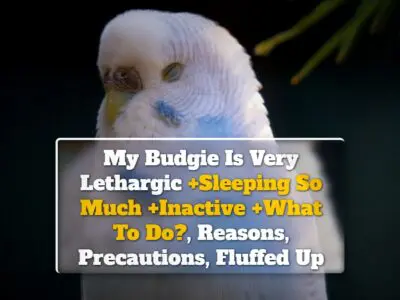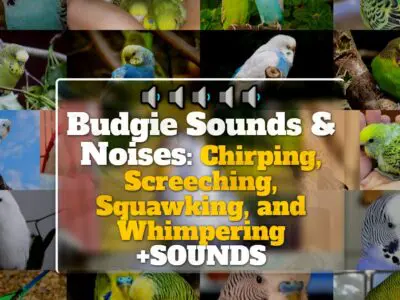Budgies are well-regarded for their vivacious vocalizations.
One of their most fascinating behaviors is their constant chirping.
Some might wonder, “Why do my budgies chirp so much?” Let’s embark on an enlightening journey to understand the reasons behind their vocal expressions.
Budgies chirp a lot as it’s their primary means of communication.
This behavior expresses their contentment, happiness, or attention-seeking tendencies.
However, excessive chirping might indicate issues like separation anxiety, boredom, stress, or illness.
At night, chirping could suggest disturbances or discomfort.
Common Reasons Of Chirping A Lot?
Let’s dive into the myriad reasons why our feathery companions, the budgies, might be indulging in extensive chirping.
Bear in mind, each budgie has its own personality, and what may hold true for one may not necessarily apply to another.
However, certain commonalities may provide an understanding of the excessive chirping.
Happiness
Budgies are social creatures who love companionship.
They show their happiness by chirping away, especially when they have their favorite people or fellow budgies around.
So, if your budgie is chirping away, it might be their way of saying, “I am happy to be here with you.”
Friendliness
Friendliness, too, is expressed by budgies through chirping.
If your budgie is chirping when a familiar person enters the room, it is their way of giving a friendly hello.
In fact, a quieter budgie could actually mean that they are not comfortable with the person or the environment.
Contentment
A happy and content budgie often expresses its well-being through chirping.
The birds’ chirping might be a reflection of their satisfied state of mind.
For them, their secure environment could be equivalent to a symphony of songs, and they participate by adding their chirping to the mix.
Just like we hum or whistle when we are content, budgies, too, have their own way of communicating their contentment.
Attention Seeking
Just as children cry or throw tantrums to grab attention, budgies resort to chirping.
If you notice your budgie chirping more than usual when you are not around, or when they see you focusing on something else, it could be their call for attention.
Separation Anxiety
Some budgies can become attached to their owners, and when left alone, they may chirp excessively as an expression of separation anxiety.
Chirping And Boredom
Boredom is another culprit.
When budgies lack mental or physical stimulation, they might resort to chirping as a means to keep themselves occupied or to call for engagement.
Chirping And Stress
Just as we get stressed, budgies too can experience stress.
They express their anxiety through continuous chirping.
This could be due to changes in their environment, the absence of their companions, or health issues.
Chirping As An Indicator Of Illness
On some occasions, the incessant chirping might be a sign of illness.
It could be their way of expressing discomfort or pain.
Chirping As A Form Of Communication
And last but not least, budgies chirp to communicate.
It could be their way of saying they are hungry, need a drink, or are just trying to join in the human conversations around them.
Chirping Because Of Fear
Fear is a powerful emotion, and for budgies, it often manifests as changes in vocal behavior, including excessive chirping.
When budgies feel threatened or scared, they might use loud, incessant chirping as an alarm call, alerting others of the perceived danger.
Several triggers can instill fear in budgies.
A new environment, unfamiliar people, other pets, loud noises, sudden movements, predators, or even new toys can scare your budgie and cause them to chirp excessively.
It’s their way of expressing their discomfort and uncertainty.
Why Does My Budgie Chirp When I Leave The Room?
Have you ever noticed your budgie suddenly elevating their chirping scale as soon as you step out of the room? You’re not alone in this observation.
This behavior can seem puzzling at first, but it’s rooted in the budgie’s instinctual and social behaviors.
Budgies are remarkably social creatures.
They are accustomed to living in large flocks in the wild.
Within these flocks, constant communication is essential for survival and social interaction.
Hence, when you, their human companion, leave the room, they could feel alone.
Their increased chirping could be an attempt to re-establish that lost connection.
Think about how a child might call out for their parent when they suddenly disappear from sight; it’s a similar scenario with your budgie.
In your absence, they could feel isolated or anxious, so they chirp in an attempt to reach out to you or to express their anxiety about being alone.
Another possibility is that your budgie sees you as part of their flock, and when you leave the room, they might be calling out to you to ensure you’re nearby, just as they would do with other budgies in a flock setting.
Why Does My Budgie Chirp When I Play Music Or Sing?
Music has a universal appeal, transcending species barriers.
It comes as no surprise then that our budgie friends too are fond of a good tune.
If your budgie chirps when you play music or sing, it can be a delightful sign of their engagement with the auditory stimuli around them.
Loves The Music
The first and most heartwarming explanation could be that your budgie simply loves the music.
Budgies, like many other birds, are attracted to melodious sounds.
They have a keen sense of hearing, and the music might just hit the right notes for them.
Your budgie’s chirping could be their way of expressing joy or excitement stimulated by the music.
Singing Along
The next reason is quite entertaining, and anyone who has spent time around budgies can vouch for it.
Your budgie might be trying to sing along! Budgies are known for their ability to mimic sounds.
If your budgie hears you singing or hears music, they might attempt to join the chorus with their version of the song, which comes out as chirping.
Hates The Music
On the flip side, the increased chirping could also indicate your budgie’s discomfort with the music.
Not all sounds are pleasing to a budgie’s ears.
If the music is too loud or the frequency doesn’t agree with them, they might chirp more as a sign of stress or agitation.
Why Do Budgies Chirp When Sleeping?
Night-time chirping of budgies is another intriguing aspect of their behavior that often leaves their owners perplexed.
When it’s time for bed, you’d expect silence from your feathery companions, but at times, you might hear them chirping even when it’s dark.
There are several reasons for this, and it’s important to note that some are perfectly normal, while others may require attention.
For some budgies, the night-time chirping could simply be their way of saying goodnight to their flock, which in a domestic setting, could be their human family or other pets.
Budgies in the wild tend to make a series of calls before they settle down for the night, and your budgie could be following this instinctual pattern.
On the other hand, if your budgie has just moved to a new cage or a new location, they might chirp at night due to the unfamiliar surroundings.
It’s their way of communicating their discomfort or anxiety about the new environment.
Night frights are another common cause of nocturnal chirping.
Budgies are prone to being scared by sudden noises, movements, or changes in light.
When they get frightened in the middle of the night, they might start chirping as an alarm call.
However, constant or excessively loud chirping during the night could indicate a health issue.
Respiratory issues, for instance, can cause discomfort, leading to chirping.
Is There Such A Thing As Too Much Chirping?
Is there a thing as too much chirping? Well, it depends.
Generally, chirping is a sign of a healthy and happy budgie.
They chirp to express their emotions, interact with their environment, or communicate with you or other birds.
However, if your budgie’s chirping becomes unusually loud, incessant, or is accompanied by other signs of distress or abnormal behavior, it might be a cause for concern.
For example, a budgie that is constantly chirping loudly could be stressed or feeling threatened.
Similarly, if your budgie’s chirping becomes more intense after a change in their environment, it might be an indication that they are not comfortable with the change.
On the other hand, excessive chirping could also be due to positive reasons.
Your budgie might simply be excited or happy.
They could be responding to stimuli in their environment that they find particularly engaging, such as music or the presence of certain people.
Remember, understanding the context and observing any accompanying behaviors is crucial to determine if your budgie’s chirping is normal or if it’s a sign of an issue.
As a responsible budgie parent, being attuned to your budgie’s behaviors and their subtle changes can make a significant difference in ensuring their well-being.
If in doubt, always consult a vet.
How To Understand If It Is Excessive Chirping?
Distinguishing between normal and excessive chirping can be tricky since budgies are naturally vocal creatures.
However, there are certain factors and signs you can pay attention to, which can help you determine if the chirping has become excessive.
Firstly, get to know your budgie’s normal behavior.
Familiarize yourself with their usual levels of chirping and the typical times when they are most vocal.
Any significant deviations from this norm might indicate excessive chirping.
Secondly, observe the intensity and the frequency of the chirping.
If your budgie seems to be chirping louder and more often than usual, it might be a sign of excessive chirping.
Additionally, if your budgie is chirping incessantly with little to no breaks, it could be an indication of an issue.
Pay attention to any changes in your budgie’s environment.
Have you introduced a new pet? Have you moved their cage to a new location? Changes like these can cause your budgie to chirp excessively due to stress or discomfort.
Another way to gauge if the chirping is excessive is to look for accompanying signs of distress or illness.
Is your budgie also fluffed up, lethargic, or showing changes in appetite or droppings? Such symptoms along with increased chirping could be a warning sign that something is not right.
Do All Budgies Chirp A Lot?
Chirping is their primary means of budgie communication.
But do all budgies chirp a lot? As someone who’s had hands-on experience with these wonderful creatures, I can tell you that while most budgies are indeed quite vocal, there is a degree of individual variation.
Budgies, in general, are known for their lively nature and their love for interaction, whether it’s with their human companions or their bird mates.
Their chirping is an expression of their active, social nature.
This is why many budgie owners find their pets chirping throughout the day, especially during the early morning and late afternoon, which are their most active hours.
However, not every budgie will chirp to the same degree.
Some budgies might be more vocal, indulging in a melodious chatter all day, while others might be more reserved, choosing to chirp only at specific times or when they want to communicate something specific.
Factors like their environment, their mood, their health, and their personality can influence a budgie’s chirping habits.
For instance, a budgie who feels safe and content in their environment might chirp more compared to a budgie who’s stressed or uncomfortable.
To put it simply, while budgies are known for their chirping, not all of them chirp a lot.
As a budgie parent, the key lies in understanding your individual budgie’s behavior and communication patterns.
As you spend more time with your budgie, you’ll start recognizing their normal chirping patterns, helping you understand when they’re just being their chirpy self and when something might be off.
What Can I Do To Stop My Budgie From Chirping Excessively?
While the cheerful chirping of a budgie can be music to the ears, excessive chirping can sometimes be a sign of a problem.
If your budgie is chirping excessively, there are several strategies you can employ to help them calm down.
Firstly, ensure that your budgie’s environment is comfortable and stress-free.
Is the cage big enough? Is it clean and well-equipped with toys, perches, and food and water containers? An uncomfortable or boring environment can lead to excessive chirping.
Secondly, provide your budgie with plenty of mental stimulation.
Boredom can often result in excessive chirping.
Interactive toys, foraging activities, and time outside the cage (safely supervised, of course) can keep your budgie mentally stimulated and reduce excessive chirping.
Creating a consistent routine can also help.
Budgies thrive on routine, and changes can cause them to chirp excessively.
Try to maintain a consistent schedule for feeding, playtime, and bedtime.
Another crucial aspect is social interaction.
Budgies are extremely social and may chirp excessively if they feel lonely.
Spend quality time with your budgie each day, talking to them, and engaging in play.
If you’re often away, consider getting another budgie for companionship.
If your budgie’s excessive chirping is accompanied by other signs of distress or illness, such as changes in appetite or droppings, fluffed up feathers, or lethargy, it’s essential to consult with a vet.
The excessive chirping might be a symptom of a health issue that needs professional attention.
Is Excessive Chirping Always A Sign Of A Problem In Budgies?
As a bird enthusiast and a former veterinary worker, I can tell you that excessive chirping in budgies isn’t always a sign of a problem.
Budgies are naturally vocal creatures, and chirping is their primary means of communication.
It’s how they express their emotions, engage with their environment, and communicate with their human companions or other budgies.
In many cases, excessive chirping can be a sign of a happy, healthy, and engaged budgie.
They might chirp more when they’re excited, when they’re enjoying their favorite music, when they’re communicating with other birds or their human family, or when they’re playing with their favorite toy.
However, it’s also true that excessive chirping can sometimes indicate an issue.
It might be a sign that your budgie is stressed, anxious, scared, uncomfortable, or even ill.
Changes in the environment, a new diet, the presence of a new pet, or a health issue can cause your budgie to chirp more than usual.
Can Excessive Chirping Be A Sign Of Boredom In Budgies?
Absolutely! Budgies are intelligent and social creatures, and they require mental stimulation and interaction.
When they are bored, they might resort to excessive chirping as a way to entertain themselves or to signal their need for attention and engagement.
Bored budgies may chirp loudly and incessantly, and this can be accompanied by other signs of boredom, such as pacing around the cage, over-preening (which could lead to feather plucking), or even displaying signs of aggression.



